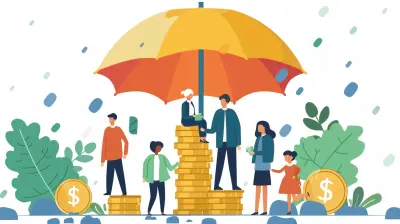Understanding Debt Consolidation: Is It the Right Move?
26 October 2025
If you're drowning in multiple bills, juggling due dates, or feeling overwhelmed by interest rates that seem to grow on their own, you’re definitely not alone. Millions of people are in the same boat — steering through the turbulent seas of credit card debt, student loans, medical bills, and personal loans. One term that often pops up as a potential lifeboat? Debt consolidation.
But the big question is: _Does it actually work?_ And more importantly, is it the right move for you?
Let’s break this concept down together—clear, simple, and without the financial jargon headache.
What Is Debt Consolidation, Really?
Imagine your debts are like a bunch of spinning plates. Every plate is a bill, a loan, or a high-interest credit card. Keeping them all spinning? Stressful. Debt consolidation is like taking all those spinning plates and stacking them into one solid, manageable pile.In more technical terms, debt consolidation means rolling multiple debts into a single loan or payment plan. You essentially borrow money (usually through a personal loan or balance transfer credit card) to pay off all your current debts. Then, instead of paying five or six lenders, you pay just one.
Sounds simple? That’s because it is—at least on paper.
Types of Debt Consolidation
Depending on your situation, you’ve got a few different ways to consolidate debt. Each one comes with its own pros, cons, and fine print.1. Personal Debt Consolidation Loans
These are unsecured loans you can get from a bank, credit union, or online lender. You use the loan to pay off all your existing debts and then focus on making a single monthly payment with a fixed interest rate.Pros:
- Fixed interest rate
- Defined repayment term
- One monthly payment
Cons:
- May require good credit
- Origination fees might apply
- Interest rates can be higher than expected
2. Balance Transfer Credit Cards
Credit card companies sometimes offer promotional 0% APR balance transfers. You move all your balances to one card and enjoy interest-free payments for a limited time—usually 12-18 months.Pros:
- 0% interest for a promo period
- Can save lots on interest
Cons:
- Requires excellent credit
- Transfer fees (typically 3-5%)
- Interest skyrockets after the promo period ends
3. Home Equity Loan or Line of Credit (HELOC)
If you own a home, you can tap into its equity. It's like borrowing against your house to pay off other debts.Pros:
- Lower interest rates
- Larger borrowing amounts
Cons:
- You're putting your home at risk
- Involves closing costs and paperwork
4. Debt Management Plan (DMP)
Offered by nonprofit credit counseling agencies, a DMP is a structured repayment plan. You make one payment to the agency, and they handle distributing the funds to your creditors.Pros:
- Professional help
- May reduce interest rates
Cons:
- Monthly fees
- Takes time (often 3-5 years)
- Might impact your credit access
Is Debt Consolidation the Same as Debt Settlement?
Nope. Big difference here.Debt consolidation combines your debts — you still pay the full amount, just in a more convenient or cost-effective way.
Debt settlement, on the other hand, means negotiating with creditors to pay less than what you owe. It’s riskier, can tank your credit, and often involves upfront fees from shady companies. Tread very, very carefully if you're considering this route.
When Does Debt Consolidation Make Sense?
Alright, let’s get real. Debt consolidation isn't a magic wand, but under the right circumstances, it can be a game-changer.Here are some signs it could be a smart move:
1. You're juggling multiple high-interest debts
Credit cards with 20% APR or more? That’s brutal. Consolidating into a lower-rate loan could save you thousands over time.
2. You have a good credit score
Lenders offer the best terms to borrowers with solid credit. If your score is strong (think 670+), you’ve got a shot at snagging a great deal.
3. Your monthly payments are eating you alive
Consolidating can reduce your monthly payment by stretching out the term. Just be aware that longer terms might mean paying more overall in interest.
4. You're tired of managing multiple due dates
One bill, one due date, one less thing to stress about.
5. You have a plan and a budget
Debt consolidation only works if you change whatever got you into debt in the first place. If you’re ready to budget and spend more mindfully—then yes, it could definitely help.
Signs That Debt Consolidation Might Not Be the Right Move
Now for the flip side. As enticing as it sounds, debt consolidation isn't for everyone.Here’s when you might want to hit the pause button:
1. Your spending habits haven’t changed
If you're still swiping credit cards recklessly, consolidation just frees up more room to rack up new debt. That's like bailing water from a sinking boat with a hole in it.
2. Your credit isn’t great
A lower credit score could mean higher interest rates on a consolidation loan—sometimes worse than what you’re already paying.
3. You're close to paying off your debts already
If you’re just a few months from being debt-free, consolidating might not be worth the effort and fees.
4. You’re tempted to splurge again
After consolidating, it’s super easy to see those zero balances and start spending again. That’s just restarting the cycle.
Credit Score Impact: Will It Hurt or Help?
Okay, this is important. Debt consolidation can affect your credit—both positively and negatively.Short-term hit: Applying for new credit almost always causes a small, temporary dip. Plus, if you close old credit cards, your credit utilization ratio might spike (which isn’t good for your score).
Long-term help: If you pay on time and reduce your debt, your score can rise over time. Fewer late payments and lower balances are gold stars in the eyes of credit bureaus.
So yes, debt consolidation can help your credit, as long as you play it smart.
How To Actually Get Started with Debt Consolidation
Ready to take the plunge? Here's a straightforward plan:Step 1: Know What You Owe
Grab a notebook or open a spreadsheet. List every debt you have—credit cards, loans, balances, interest rates, minimum payments.Step 2: Check Your Credit Score
This matters. The better your score, the better your loan terms. Use free credit monitoring tools or request a report from AnnualCreditReport.com.Step 3: Compare Lenders or Options
Research personal loans, balance transfer cards, or talk to a credit counselor. Don’t just grab the first offer—look at interest rates, fees, and repayment terms.Step 4: Apply
Once you’ve found the best fit, apply. Be ready for a hard inquiry on your credit report.Step 5: Follow Through
Use the loan/card to pay off your debts. Set up auto-pay for your new consolidated loan. Then — and this is key — stop using your credit cards (or at least be super disciplined about them).Alternatives to Debt Consolidation
Maybe consolidation doesn’t sound like your thing. That’s fine! There are other tools in the toolbox.- Snowball Method: Focus on paying off your smallest debt first, then roll that payment into the next one.
- Avalanche Method: Tackle the debt with the highest interest rate first.
- Credit Counseling: Nonprofits offer guidance and budgeting help.
- Bankruptcy: A last-resort option, but sometimes necessary.
The Bottom Line: Is Debt Consolidation the Right Move?
Well… it depends.Debt consolidation isn’t a miracle solution, but it can be a powerful strategy if you’re disciplined and ready for a fresh start. It simplifies your payments, may lower your interest rates, and helps you get a grip on your financial chaos. But it only works if you address the root of the problem: spending more than you earn.
So ask yourself:
Are you ready to manage money differently?
Will you resist the urge to fall back into debt?
Are you committed to making real change?
If you answered "yes," then debt consolidation might just be the right move for you.
And if you're still unsure? That’s okay too. Take a breath, run the numbers, talk to someone you trust, and move forward with confidence. Your financial freedom isn’t a dream—it’s a decision away.
all images in this post were generated using AI tools
Category:
Debt ManagementAuthor:

Julia Phillips
Discussion
rate this article
1 comments
Ariadne McNair
Empower your finances: consolidate, conquer debt!
October 30, 2025 at 11:42 AM

Julia Phillips
Thank you for your comment! Debt consolidation can be a powerful tool for managing finances effectively. It’s all about finding the right strategy for your situation.


